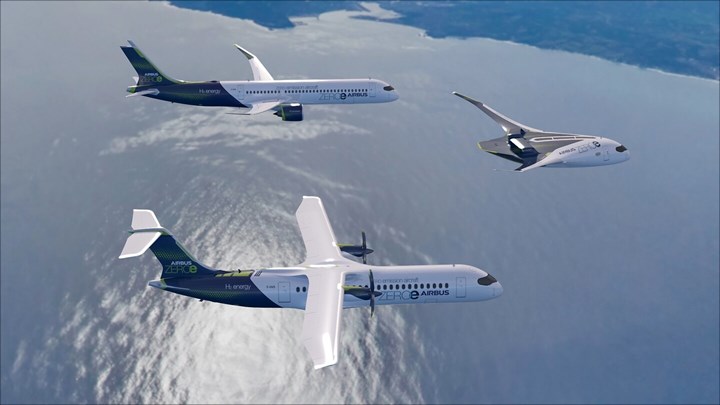Airbus launches U.K. ZEDC center for hydrogen technologies
Filton, Bristol location will cover full product capabilities from components up to whole system and cryogenic testing, complementing Airbus’ existing ZEDC facilities for the ZEROe’s 2035 entry-into-service date.
Airbus (Filton, U.K.) reported on May 25 that it is strengthening its presence in the U.K. with the launch of a Zero Emission Development Centre (ZEDC) for hydrogen technologies. A priority for the U.K. ZEDC will be the development of a cost-competitive cryogenic fuel system required for the successful entry-into-service of Airbus’ ZEROe passenger aircraft by 2035 and to accelerate U.K. skills and know-how on hydrogen-propulsion technologies. This is in addition to those ZEDCs already established in Germany and France.
The U.K. ZEDC, specifically, will benefit from the recent commitment by the UK Government to guarantee £685 million of funding to the Aerospace Technology Institute (ATI) over the next three years to support the development of zero-carbon and ultra-low-emission aircraft technologies.
“Establishing the ZEDC in the U.K. expands Airbus’ in-house industrial capabilities to design, develop, test and manufacture cryogenic hydrogen storage tanks and related systems for the ZEROe project across Airbus’ four home countries,” Sabine Klauke, Airbus chief technical officer (CTO), notes. “This, coupled with our partnership with ATI, will allow us to leverage our respective expertise to realize the potential of hydrogen technology to support the decarbonization of the aviation industry.”
Technology development at the new U.K. ZEDC, to be based in Filton, Bristol, has already started and will cover the full product capabilities from components up to whole system and cryogenic testing. End-to-end fuel systems development, reported to be a specialty of Airbus in the U.K., is one of the most complex technologies crucial to the performance of a future hydrogen aircraft.
The ZEDC complements Airbus’ existing Research and Technology footprint in the U.K., as well as the work on cryogenic liquid hydrogen tanks being done at Airbus’ existing ZEDCs in Madrid, Spain and Stade, Germany (composite structure technologies) and in Nantes, France and Bremen, Germany (metallic structural technologies). All Airbus ZEDCs are expected to be fully operational and ready for ground testing with the first fully functional cryogenic hydrogen tank during 2023, and with flight testing starting in 2026.
The launch of the U.K. ZEDC also follows the opening of the £40 million AIRTeC research and testing facility in Filton in June 2021, jointly funded by the ATI and Airbus, to deliver the next generation of aircraft wing, landing-gear systems and fuel system designs.
Related Content
-
Plant tour: Spirit AeroSystems, Belfast, Northern Ireland, U.K.
Purpose-built facility employs resin transfer infusion (RTI) and assembly technology to manufacture today’s composite A220 wings, and prepares for future new programs and production ramp-ups.
-
Welding is not bonding
Discussion of the issues in our understanding of thermoplastic composite welded structures and certification of the latest materials and welding technologies for future airframes.
-
Composites manufacturing for general aviation aircraft
General aviation, certified and experimental, has increasingly embraced composites over the decades, a path further driven by leveraged innovation in materials and processes and the evolving AAM market.

















